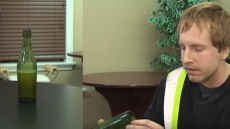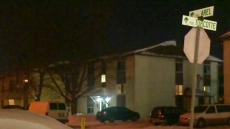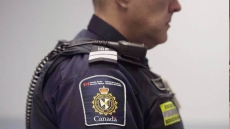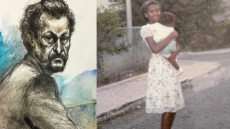TORONTO — A Toronto police officer was "a hothead and a bully" when he shot down a teen on an empty streetcar, a Crown prosecutor argued Thursday as he tried to convince a jury the man had viable alternatives to lethal force but didn't use them.
Const. James Forcillo has pleaded not guilty to second-degree murder and attempted murder in the death of 18-year-old Sammy Yatim — an incident which triggered outrage across the city two and a half years ago.
As the trial draws to a close, Crown prosecutor Milan Rupic told jurors Forcillo wanted to assert his authority over a "mouthy, mocking teenager" without trying to make a connection with a person he knew was in crisis.
"During his standoff with Sammy Yatim the defendant was a hothead and a bully," Rupic said in his closing address. "He wore the uniform of a police officer but he did not act like a police officer."
Forcillo's lawyer has argued in his own closing statement that the Crown is trying to "criminalize a judgement call" made by a first responder.
In calling for Forcillo's acquittal, defence lawyer Peter Brauti has said the officer's actions were justified and carried out in self-defence.
He has also placed blame for the incident squarely on Yatim's shoulders, saying the knife-toting, unco-operative teen "got himself shot."
But Rupic attacked that suggestion head on.
"It is wrong to say Sammy Yatim got himself shot," said Rupic. "It was not necessary and it was not reasonable for the defendant Forcillo to shoot the young man."
The jury has heard that on a night in July 2013, Yatim had taken the drug ecstasy before boarding a streetcar where he exposed himself and pulled out a small knife, sparking a panicked mass exodus after the vehicle came to a stop.
Surveillance video and audio played at the trial have shown that Forcillo arrived on scene and screamed repeatedly at Yatim, who remained on the streetcar, to "drop the knife."
Yatim refused and hurled expletives at Forcillo and an increasing amount of other officers. The confrontation escalated when the teen took a few steps back from his position at the top of the streetcar's front steps.
Forcillo warned the teen he'd shoot if the youth took another step forward. He has testified he then saw Yatim flick his knife towards him before moving back towards the spot he had been in before.
Forcillo then fires nine bullets at Yatim in two separate volleys. The teen collapses immediately. The entire standoff lasted about 50 seconds.

"The defendant shot Sammy Yatim not because he posed any real threat to anyone, but rather because Yatim simply moved 50 centimetres and failed to obey the ultimatum," said Rupic, noting that the teen had not lunged or charged towards Forcillo.
Rupic reminded the jury that Forcillo testified he had been "trained to win the situation," and suggested the officer's thinking was wrong.
"I don't know where the defendant got his idea of winning from but in Canada police officers are not authorized to adhere to the folklore of the police locker-room," Rupic said, calling Forcillo's phrase a "juvenile, macho slogan."
Forcillo didn't follow his police training, contrary to what he has told the court, because he didn't engage in sufficient de-escalation, nor did he properly consider other use-of-force alternatives, Rupic said.
Forcillo also did not make use of his most valuable asset — time, Rupic said.
Yatim's behaviour that night was "appalling," Rupic conceded, but the youth had not been in a frenzy and did not exhibit signs he wanted to "fight to the end," as Forcillo suggested.
"It was the defendant who turned up the temperature on the scene," Rupic said, reminding the jury that Forcillo used profanity in his commands.
"The defendant was motivated not by his training, but by a bad feeling against Sammy Yatim that resulted from Yatim's mocking and contemptuous challenge to his authority."
Rupic also accused Forcillo's lawyer of attempt to "distract" the jury by calling emotional testimony from a woman on the streetcar who was sitting near Yatim when he swiped his knife towards her.
"The defendant simply did not know anything about what happened at the rear of the streetcar, and it therefore did not affect his decision to shoot."





